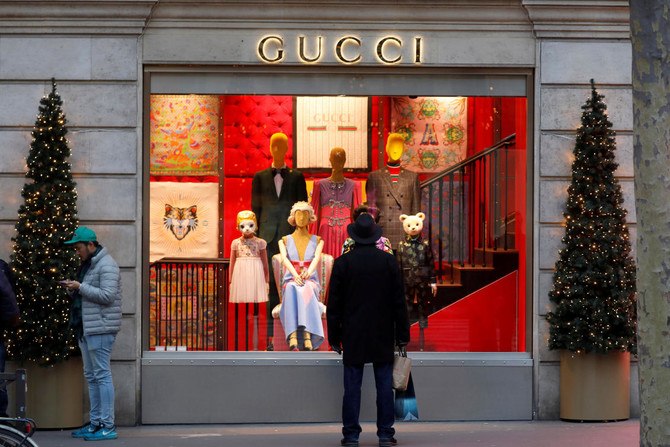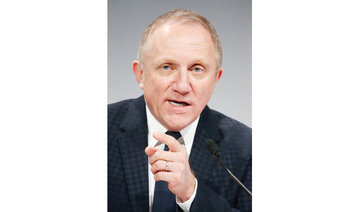PARIS: Gucci-owner Kering posted better-than-expected sales growth in the fourth quarter and said 2018 should be another solid year as the French group refocuses its business solely on luxury.
Along with peers in the luxury goods industry including French rival LVMH, Kering benefited from a recovery in demand from Chinese consumers at home and overseas last year, while rising online sales have also propelled growth.
That trend should continue this year with strong momentum at Kering fashion labels including star performer Gucci and Balenciaga, though the group cautioned that currency swings and a strong euro could weigh on its performance.
Shares in the company -- which hit a record high of €417.40 in January and surged more than 80 percent last year -- retreated by 1.6 percent to €373.60 in early session trading.
Analysts gave generally positive reactions to Kering's results, but Exane BNP Paribas said the company might find it harder to come up with even stronger results in future.
"Kering delivered a phenomenal year in 2017," chairman and CEO Francois-Henri Pinault said in a statement, adding that the global environment remained uncertain but that Kering could do "much better than our markets" in 2018.
Kering, which also owns Yves Saint Laurent, has reaped the rewards from an overhaul at Italian fashion house Gucci over the past two years and it revamping itself to focus solely on its luxury credentials.
It plans to spin off 70 percent of its sportswear brand Puma to its own shareholders, which include the Pinault family, through its Artemis holding.
Kering will retain a stake of just under 16 percent in Puma - which posted an upbeat assessment for 2018 on Monday - and the disposal is now set for May 16.
Overall revenues rose to €4.26 billion ($5.25 billion) in the fourth quarter, up 27.4 percent year-on-year on a comparable basis, which strips out acquisitions and currency swings.
That marked a slight slowdown from the 28.4 percent growth notched up in the previous three months but beat a 24.3 percent analyst poll by Inquiry Financial.
Kering's high-end fashion labels - with the exception of leather goods specialist Bottega Veneta, which is improving slowly following a turnaround - notched up strong sales growth in 2017.
Revenues in Kering's luxury goods unit rose 30.5 percent on a comparable basis year-on-year in the fourth quarter. By contrast, sales at Louis Vuitton-owner LVMH's fashion and leather goods division were up 10 percent on a constant currency basis in the period.
Momentum at Gucci - which was reinvented with a flamboyant new look under designer Alessandro Michele and recently branched into homeware with 295 euro mugs in butterfly motifs - also eased a touch.
But it remained well above that of most major rival brands, with comparable sales growth of nearly 43 percent in the quarter.
Kering financial director Jean-Marc Duplaix told journalists that the group's Balenciaga label, for which it does not break out earnings, posted higher growth than Gucci in the second half of 2017.
Kering posted a 56.3 percent rise in adjusted operating income to €2.95 billion for 2017 as a whole, also beating forecasts, while full year revenues rose 27.2 percent on a comparable basis to €15.48 billion.













